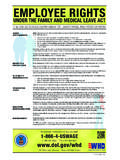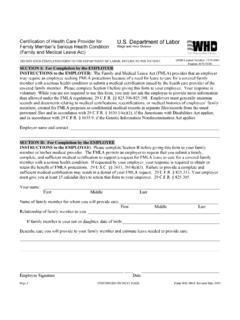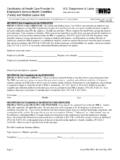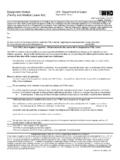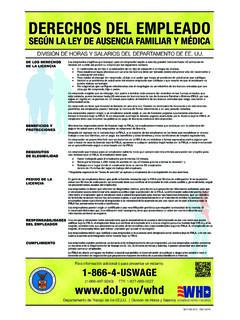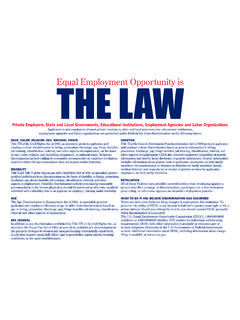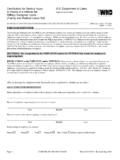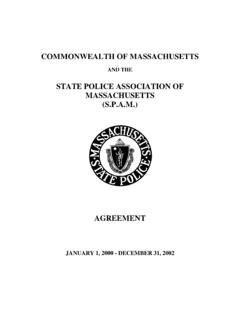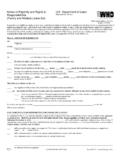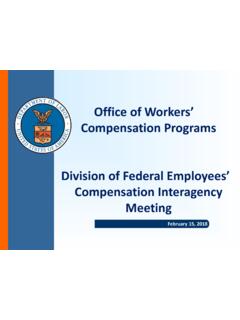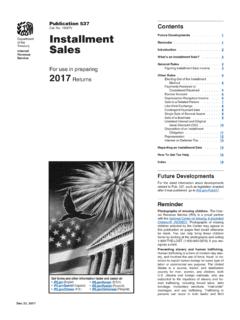Transcription of Fact Sheet #17G: Salary Basis Requirement and the Part 541 ...
1 Department of Labor Wage and Hour Division (Revised July 2008) Fact Sheet #17G: Salary Basis Requirement and the Part 541 Exemptions Under the Fair Labor Standards Act (FLSA) This fact Sheet provides general information on the exemption from minimum wage and overtime pay provided by Section 13(a)(1) of the Fair Labor Standards Act as defined by Regulations, 29 CFR Part 541. The FLSA requires that most employees in the United States be paid at least the federal minimum wage for all hours worked and overtime pay at time and one-half the regular rate of pay for all hours worked over 40 hours in a workweek. However, Section 13(a)(1) of the FLSA provides an exemption from both minimum wage and overtime pay for employees employed as bona fide executive, administrative, professional and outside sales employees.
2 Section 13(a)(1) and Section 13(a)(17) also exempt certain computer employees. To qualify for exemption, employees generally must meet certain tests regarding their job duties and be paid on a Salary Basis at not less than $455* per week. Job titles do not determine exempt status. In order for an exemption to apply, an employee s specific job duties and Salary must meet all the requirements of the Department s regulations. See other fact sheets in this series for more information on the exemptions for executive, administrative, professional, computer and outside sales employees. Salary Basis Requirement To qualify for exemption, employees generally must be paid at not less than $455* per week on a Salary Basis .
3 These Salary requirements do not apply to outside sales employees, teachers, and employees practicing law or medicine. Exempt computer employees may be paid at least $455* on a Salary Basis or on an hourly Basis at a rate not less than $ an hour. Being paid on a Salary Basis means an employee regularly receives a predetermined amount of compensation each pay period on a weekly, or less frequent, Basis . The predetermined amount cannot be reduced because of variations in the quality or quantity of the employee s work. Subject to exceptions listed below, an exempt employee must receive the full Salary for any week in which the employee performs any work, regardless of the number of days or hours worked.
4 Exempt employees do not need to be paid for any workweek in which they perform no work. If the employer makes deductions from an employee s predetermined Salary , , because of the operating requirements of the business, that employee is not paid on a Salary Basis . If the employee is ready, willing and able to work, deductions may not be made for time when work is not available. Circumstances in Which the Employer May Make Deductions from Pay Deductions from pay are permissible when an exempt employee: is absent from work for one or more full days for personal reasons other than sickness or disability; for absences of one or more full days due to sickness or disability if the deduction is made in accordance with a bona fide plan, policy or practice of providing compensation for Salary lost due to illness; to offset amounts employees receive as jury or witness fees, or for military pay; for penalties imposed in good faith for infractions of safety rules of major significance.
5 Or for unpaid disciplinary suspensions of one or more full days imposed in good faith for workplace conduct rule infractions. Also, an employer is not required to pay the full Salary in the initial or terminal week of employment, or for weeks in which an exempt employee takes unpaid leave under the Family and Medical Leave Act. FS 17 GEffect of Improper Deductions from Salary The employer will lose the exemption if it has an actual practice of making improper deductions from Salary . Factors to consider when determining whether an employer has an actual practice of making improper deductions include, but are not limited to: the number of improper deductions, particularly as compared to the number of employee infractions warranting deductions; the time period during which the employer made improper deductions; the number and geographic location of both the employees whose Salary was improperly reduced and the managers responsible; and whether the employer has a clearly communicated policy permitting or prohibiting improper deductions.
6 If an actual practice is found, the exemption is lost during the time period of the deductions for employees in the same job classification working for the same managers responsible for the improper deductions. Isolated or inadvertent improper deductions will not result in loss of the exemption if the employer reimburses the employee for the improper deductions. Safe Harbor If an employer (1) has a clearly communicated policy prohibiting improper deductions and including a complaint mechanism, (2) reimburses employees for any improper deductions, and (3) makes a good faith commitment to comply in the future, the employer will not lose the exemption for any employees unless the employer willfully violates the policy by continuing the improper deductions after receiving employee complaints.
7 Fee Basis Administrative, professional and computer employees may be paid on a fee Basis rather than on a Salary Basis . If the employee is paid an agreed sum for a single job, regardless of the time required for its completion, the employee will be considered to be paid on a fee Basis . A fee payment is generally paid for a unique job, rather than for a series of jobs repeated a number of times and for which identical payments repeatedly are made. To determine whether the fee payment meets the minimum Salary level Requirement , the test is to consider the time worked on the job and determine whether the payment is at a rate that would amount to at least $455* per week if the employee worked 40 hours.
8 For example, an artist paid $250 for a picture that took 20 hours to complete meets the minimum Salary Requirement since the rate would yield $500 if 40 hours were worked. Where to Obtain Additional Information For additional information, visit our Wage and Hour Division Website: and/or call our toll-free information and helpline, available 8 to 5 in your time zone, 1-866-4 USWAGE (1-866-487-9243). When the state laws differ from the federal FLSA, an employer must comply with the standard most protective to employees. Links to your state labor department can be found at This publication is for general information and is not to be considered in the same light as official statements of position contained in the regulations.
9 Department of Labor Frances Perkins Building 200 Constitution Avenue, NW Washington, DC 20210 1-866-4-USWAGE TTY: 1-866-487-9243 Contact UsNote (added January 2018): *The Department of Labor is undertaking rulemaking to revise the regulations located at 29 part 541, which govern the exemption of executiveadministrative, and professional employees from the Fair Labor Standards Act s minimum wage and overtime pay requirements. Until the Department issues its final rule, it will enforce the part 541 regulations in effect on November 30, 2016, including the $455 per week standard Salary level. These regulations are available at.
